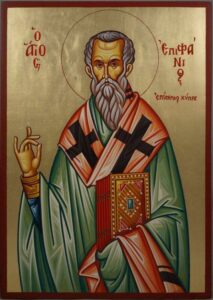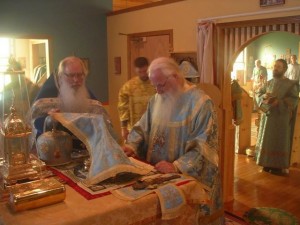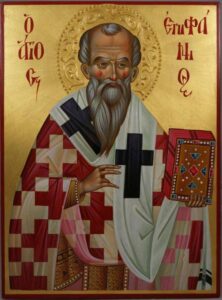Mar Epiphanius of Salamis (Cyprus) – July 25 I (310 AD – 403 AD)

Mar Epiphanius is considered a saint and a Church Father by both the Orthodox and Roman Catholic Churches. He was a zealous bishop and a revered ascetic, who gained a reputation as a strong defender of Orthodoxy. Epiphanius was born in a Hellenised Christian Jewish family, in the small settlement of Besanduk, near Eleutheropolis (modern-day Beth Guvring, Jibrin) meaning ‘house of strong men’, in Palestine,in around 310 – 315 AD. In his youth he began to study the Holy Scriptures. He was destined for the priesthood and at an early age and he became a priest in Palestine, later moved to Egypt and stayed at several desert communities, to perfect himself. He lived as a monk in Egypt, where he was educated. Entering the monastery, he progressed in the monastic life under the guidance of the experienced Elder Hilarion, to whom he became his disciple and he occupied himself with copying Greek books.
Because of his ascetic struggles and virtues, Saint Epiphanius was granted the gift of wonderworking. To avoid human glory, Epiphanius set out to the Spanidrion desert where robbers fell upon him and held him for three months. By his talk about repentance, Epiphanius brought one of the gang of robbers to the faith in the True God. When he was set free, the robber joined him. Epiphanius took him to his monastery and baptized him with the name John. From that time John became a faithful disciple of Epiphanius and carefully recorded in writing about the life and miracles of his spiritual guide.
Returning to the wilderness of Palestine about 333 – 367 A.D, while still a young man, he founded a monastery at Ad nearby. Epiphanius again sought the ascetic life with his disciple John. As the reputation of Epiphanius spread, more disciples came to him leading to his founding a monastery in Ad. There he was ordained a priest, lived and studied as superior of the monastery in Ad that he founded for thirty years and gained much skill and knowledge in that position. He gained the ability to speak in several to and fluency in the languages needed to understand scripture including Hebrew, Syriac, Egyptian, Greek and Latin, and was called by Jerome on that account Pentaglossis ‘Five tongued’. Not only Epiphanius was a master of many languages, but he was also a scholar of profound biblical culture and had a passion for pure doctrine, a pure loathing for error in all its forms. He distrusted classical literature because of the taint of idolatry.
His reputation for learning prompted his nomination and consecration as Bishop of Salamis, Cyprus,in 365 or 367, a post which he held until his death. He was also the Metropolitan of the Church of Cyprus. He served as bishop for nearly forty years, as well as travelled widely to combat unorthodox beliefs. He was present at local synods, where the Trinitarian questions were debated against the heresy of Apollinarianism.
Saint Epiphanius was known for his great zeal for the Faith, his love and charity for the poor and for his almsgiving and his simplicity of character and his deep spirituality. No one surpassed him in his tenderness and charity to the poor, and he gave vast sums of money to those in need. He suffered much from the slander and enmity of some of his clergy. Because of the purity of his life, Saint Epiphanius was permitted to see the coming of the Holy Spirit upon the Gifts at Divine Liturgy. Once, when Mar Epiphanius was celebrating the Holy Mystery, he did not see this vision. He then became suspicious of one of the clergy and quietly said to him, “Depart, my son, for you are unworthy to participate in the celebration of the Mystery today.”

He is known for composing a large compendium of the heresies in his time. He had the zeal to preserve the purity of the Orthodox Faith. we must admire Saint Epiphanius for his dedication in defending Orthodoxy against false teachings. His chief work is the Panarion (374–377), an account of 80 heresies and their refutations, which ends with a statement of orthodox doctrine. His Ancoratus (374) is a compendium of the teachings of the Church. His works are valuable as a source for the history of theological ideas. After all, one of the bishop’s primary responsibilities is to protect his flock from those who might lead them astray. We also honour Saint Epiphanius for his deep spirituality, and for his almsgiving, who laboured through a long life to root heresy out of the Church. No one surpassed him in his tenderness and charity to the poor, and he gave vast sums of money to those in need.
He was celebrated, not only for his virtues and miraculous deeds during life, but also for the honour that was rendered to him by God after his death; for it is said that demons were expelled, and diseases healed at his tomb. Many wonderful actions are attributed to him, of which the following is one of the most remarkable that has come to our knowledge. He compiled a reference work he called his “Medicine Chest,” diagnosing erroneous doctrines as “snakebites” and then prescribing cures from the pharmacy of true doctrine.
In 367, his reputation for learning prompted his nomination as Bishop of Constantia, Salamis, although he continued as superior of his monastery. During his time as bishop, he became known as a strong defender of orthodoxy, and would track down deviant teachings (heresies) wherever they could be found. He spent the rest of his life in that post, spreading monasticism and campaigning against heretics. He died in 403, on his way back to Cyprus from Constantinople, and was buried in Salamis. His tomb can still be seen here although his remains were removed to Constantinople by the emperor Leo at the time of the Arab raids
The boat that carried his body arrived in Cyprus from Constantinople. The priests and the people came with crosses, gospels, candles and incense and carried his body to the Church. When they started to dig his tomb, two deacons did not allow them. They were excommunicated by the saints for their bad reputation. The body remained in the Church for four days without a change or a stench. His body looked as if he was asleep. A saintly deacon came near the body and said: “I know of your relationship with God, and that you can restrain these evil opponents.” He then took an axe and hit the ground with it. The two opposing deacons fell on their faces immediately, and they were carried to their homes and died on the third day

We admire St. Epiphanius for his dedication in defending Orthodoxy against false teachings. We also honor St. Epiphanius for his deep spirituality, and for his alms-giving.
No one surpassed him in his tenderness and charity to the poor, and he gave vast sums of money to those in need. The body of the Saint was anointed and wrapped, they buried him in a marble sarcophagus in the Church. Many miracles wrought during his life and after death too. Mar Epiphanius is commemorated on July 25, in our church and May 12 by the Roman Catholic Church.
May his prayers be with us and Glory be to God forever.

0 Comments